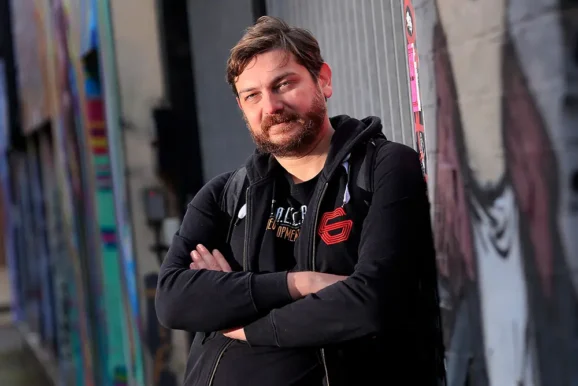Why modern computer games aren’t a patch on the classics

Aleksey Savchenko
- Published
- Opinion & Analysis, Technology

Veteran game designers are leaving the sector in droves for more job security in the government and military sectors, writes seasoned developer Aleksey Savchenko. Is this game over for the golden-age British originals like Tomb Raider?
Classic British video games such as Tomb Raider, Lemmings, Elite, GoldenEye 007, and Worms once set the gold standard for quality. They arrived polished, innovative, fully formed, and ready to play.
Compare that to today, where gamers constantly complain about the latest must-have triple-A titles being riddled with glitches and bugs. In many cases, they’re released in an unfinished state – sometimes so broken they’re virtually unplayable.
This hasn’t gone unnoticed. A recent YouGov survey found that nearly a third of British gamers believe game quality has declined in recent years. That decline is being driven by a cost-cutting frenzy sweeping the industry – one that is forcing out veteran developers and replacing them with undertrained and cheaper staff, combined with misguided attempts to automate critical production segments and indiscriminate workforce reductions that overload the remaining personnel.
For over a decade, the games industry enjoyed unchecked growth, fuelled by technological breakthroughs, mass-market appeal, and the success of live-service monetisation. By 2023, it was valued at $366 billion (£289 billion), boosted further by the Covid-era spike in gaming. The boom attracted a wave of investment, rapid scaling, and franchise-focused output.
But this growth came at a cost. Many studios scaled aggressively, hiring fast and spending heavily during a time of unprecedented expansion. As player spending slowed and investor expectations tightened, studios responded with cuts that disproportionately affected development teams. And while layoffs made headlines, many experienced developers left of their own accord – tired of short-sighted leadership, internal politics, and the pressure to create something profitable rather than meaningful.
What we’re seeing isn’t just a wave of departures, but a dismantling of the foundations that once made British game development world-class. The studios that led the industry are now hollowed out by short-term thinking and a reluctance to take creative risks.
Without veterans, studios aren’t just losing talent – they’re losing memory. Knowledge transfer, mentoring, and production discipline are vanishing. You can’t build innovative, lasting games when you’re constantly replacing experience with inexperience.
The development culture has become increasingly disconnected from the craft of making games. Executives with little to no design background now shape production around metrics, monetisation, and fast delivery. Instead of designing tomorrow’s classics, we’re ticking boxes to meet short-term targets. The result is a glut of buggy, repetitive, uninspired games that often feel unfinished on release and forgettable soon after.
Many of the veterans who have left the games industry haven’t struggled to find work. Their expertise in systems design, engineering, and production is in demand across defence, government, and immersive technology sectors. From simulation systems and national security platforms to crisis training and VR/AR environments, their skills are now powering critical infrastructure. Their work still matters – it always did – it’s just being used in industries that value it.
Systems designers and technical artists, for instance, are contributing to advanced simulation software used in military training, where their ability to model complex environments and realistic behaviours is invaluable. Others are helping to build immersive virtual reality (VR) and augmented reality (AR) platforms for mission rehearsal, tactical planning, or crisis response. They don’t make the same money as before, but they do have respect and the peace of mind that comes with job stability.
Outside of these sectors, those with strong production skills often move into small and mid-sized companies, helping to introduce efficiency where it’s needed most, while some return to making games as independent developers, free from industry bureaucracy and an ever-dangling axe over their heads.
With the culling and exodus of veterans, studios have turned to cheaper, fresh-out-of-the-gate university graduates. While the industry has behaved disgracefully in its treatment of seasoned professionals, for gamers it wouldn’t be a problem if those graduates adequately filled the gap.
But they don’t.
University game design degrees often fail to provide students with the practical skills needed to succeed in real-world development environments. Courses tend to prioritise theoretical knowledge while neglecting the realities of production pipelines, collaboration, or debugging workflows. New hires, while often passionate and creative, require significant training that few studios have time or structure to deliver. They are being set up to fail – expected to carry major projects without proper support.
This constant churn places additional strain on overworked staff and contributes to delays, inefficiencies, and ultimately higher costs. With so few experienced developers left to guide and mentor, there’s no one to train the next wave of talent – a cycle that repeats with increasingly damaging results.
Meanwhile, technical bloat continues to drag down development. Complex engines, sprawling toolsets, and fragmented workflows slow production to a crawl. Studios are pressured to ship early to keep publishers happy, regardless of whether the product is ready. That pressure results in rushed, unstable releases and burdens teams with post-launch patching instead of refining gameplay during development.
Technical debt piles up, tools get more complex, deadlines get tighter – and the people meant to hold it all together are either burnt out or gone. You can feel it in the games: the absence of joy, the lack of polish, and most of all, the unwillingness to take creative risks.
It’s not just about broken games – it’s about broken systems. Publishing producers often lack design experience, yet drive trend-based decisions without understanding production realities. Nepotism and mismanagement further destabilise teams.
Still, junior developers cost less upfront. Even if their inexperience leads to greater losses over time, the short-term savings keep studios hooked on the cycle.
In the long term, it’s the studios that lose. Without skilled developers, game companies have nothing. But without game companies, developers adapt. Many transition to new sectors or forge their own paths, developing indie titles, books, board games, comics, or immersive storytelling experiences.
So, while the veterans often land on their feet, gamers and game quality suffer. Cost-cutting leads to talent loss, and talent loss leads to broken games.
How do we fix this? It starts with studios valuing people over margins. That means investing in experienced talent, yes – but also building a production culture that encourages mentorship and knowledge transfer. Creative cultures aren’t spreadsheets. You can’t cut your way to innovation.
Junior staff aren’t the problem – but they are being set up to fail. If we want to rebuild, we must restore balance and support the next generation properly.
Ironically, the next wave of great titles may come not from major studios but from veterans who launch successful independent IPs with sustainable models. Instead of speculative growth, these creators may focus on innovation and craft, winning fan loyalty and commercial success on their own terms.
But if studios continue on their current path – recycling franchises, ignoring local IPs, and squeezing teams until they collapse – the question isn’t what games they’ll release next. It’s whether they’ll survive long enough to release anything at all.

Aleksey Savchenko is a veteran game developer, futurist, author, and BAFTA member with nearly three decades’ experience in the tech and entertainment industries. Currently the Director of R&D, Technology and External Resources at GSC Game World, he has worked on the studio’s acclaimed S.T.A.L.K.E.R. 2 and with Epic Games on expanding Unreal Engine in Eastern Europe. He is the author of Game as Business and the Cyberside series of cyberpunk graphic novels. Cyberside: Level Zero is out now.
Main image: Courtesy Kevin Ku/Pexels
RECENT ARTICLES
-
 The era of easy markets is ending — here are the risks investors can no longer ignore
The era of easy markets is ending — here are the risks investors can no longer ignore -
 Is testosterone the new performance hack for executives?
Is testosterone the new performance hack for executives? -
 Can we regulate reality? AI, sovereignty and the battle over what counts as real
Can we regulate reality? AI, sovereignty and the battle over what counts as real -
 NATO gears up for conflict as transatlantic strains grow
NATO gears up for conflict as transatlantic strains grow -
 Facial recognition is leaving the US border — and we should be concerned
Facial recognition is leaving the US border — and we should be concerned -
 Wheelchair design is stuck in the past — and disabled people are paying the price
Wheelchair design is stuck in the past — and disabled people are paying the price -
 Why Europe still needs America
Why Europe still needs America -
 Why Europe’s finance apps must start borrowing from each other’s playbooks
Why Europe’s finance apps must start borrowing from each other’s playbooks -
 Why universities must set clear rules for AI use before trust in academia erodes
Why universities must set clear rules for AI use before trust in academia erodes -
 The lucky leader: six lessons on why fortune favours some and fails others
The lucky leader: six lessons on why fortune favours some and fails others -
 Reckon AI has cracked thinking? Think again
Reckon AI has cracked thinking? Think again -
 The new 10 year National Cancer Plan: fewer measures, more heart?
The new 10 year National Cancer Plan: fewer measures, more heart? -
 The Reese Witherspoon effect: how celebrity book clubs are rewriting the rules of publishing
The Reese Witherspoon effect: how celebrity book clubs are rewriting the rules of publishing -
 The legality of tax planning in an age of moral outrage
The legality of tax planning in an age of moral outrage -
 The limits of good intentions in public policy
The limits of good intentions in public policy -
 Are favouritism and fear holding back Germany’s rearmament?
Are favouritism and fear holding back Germany’s rearmament? -
 What bestseller lists really tell us — and why they shouldn’t be the only measure of a book’s worth
What bestseller lists really tell us — and why they shouldn’t be the only measure of a book’s worth -
 Why mere survival is no longer enough for children with brain tumours
Why mere survival is no longer enough for children with brain tumours -
 What Germany’s Energiewende teaches Europe about power, risk and reality
What Germany’s Energiewende teaches Europe about power, risk and reality -
 What the Monroe Doctrine actually said — and why Trump is invoking it now
What the Monroe Doctrine actually said — and why Trump is invoking it now -
 Love with responsibility: rethinking supply chains this Valentine’s Day
Love with responsibility: rethinking supply chains this Valentine’s Day -
 Why the India–EU trade deal matters far beyond diplomacy
Why the India–EU trade deal matters far beyond diplomacy -
 Why the countryside is far safer than we think - and why apex predators belong in it
Why the countryside is far safer than we think - and why apex predators belong in it -
 What if he falls?
What if he falls? -
 Trump reminds Davos that talk still runs the world
Trump reminds Davos that talk still runs the world


























